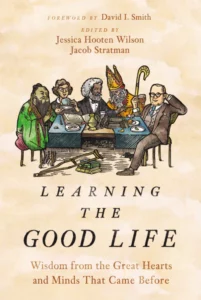 Learning the Good Life: Wisdom from the Great Hearts and Minds That Came Before edited by Jessica Hooten Wilson & Jacob Stratton (Zondervan Academic) $29.99 OUR SALE PRICE = $23.99
Learning the Good Life: Wisdom from the Great Hearts and Minds That Came Before edited by Jessica Hooten Wilson & Jacob Stratton (Zondervan Academic) $29.99 OUR SALE PRICE = $23.99
Thanks to those who commented on or ordered books from that BookNotes post a few weeks ago highlighting four wonderful new books on reading and appreciating the arts. We truly loved The Scandal of Holiness: Renewing Your Imagination in the Company of Literary Saints by Jessica Hooten Wilson with the great forward by Lauren Winner (and published by the always impressive Brazos Press, still 20% off) — how could we not, a book about books? Like a car buff going to an auto show or a sports fan at a playoff game, this is the sort of book that book lovers adore. That it showed ways to grow in spiritual maturity through reading what she creatively called “literary saints” makes it all the better. Spread the word about this tremendous read.
Since that BookNotes review and the excitement around the release of Scandal of Holiness, Dr. Hooten has yet another new book with her name on it — Learning the Good Life: Wisdom from the Great Hearts and Minds That Came Before which she co-edited with Jacob Stratton, a poet and Dean of Humanities, Bible and Arts at John Brown University in Siloam Springs, Arkansas. It just came out this week!
Scandal is a wondrous work making a case that we can grow by reading mostly contemporary novelists. Learning the Good Life is in that same sort of genre — a book about authors — but is (a) an edited collection of primary source stuff and (b) about the virtues we can develop as we study history’s grandest teachers whether they are Biblical or not. Yes, some in this book are novelists and some are poets or playwrights. Others, though, are nonfiction scholars, philosophers, public intellectuals, statesmen and women of note, journalists and essayists. This really is a dip into some of the great thinkers down through the ages.
Learning the Good Life: Wisdom from the Great Hearts and Minds That Came Before invites us into this classic conversation, deepening our own questions (and answers) about the meaning of the good life. Good pieces are offered by authors such as Confucius, Augustine, Sor Juana Inés de la Cruz, Gerard Manley Hopkins, Frederick Douglas, W.E.B. DuBois, Flannery O’Connor, Simone Weil, Marilynne Robinson, Wendell Berry and more. They explore topics as diverse as vocation and calling, the quest for meaning, suffering, beauty, wonder, community, critical thinking, virtue, reflection and more. What a book this is! Where else can you see excerpts of David Foster Wallace’s “This Is Water” and Jonathan Edwards “Personal Narrative” and Gregory of Nazianzus “On My Own Verses” and selections from Confucius, right next to Bonhoeffer and Edmund Burke? Kudos to Zondervan for including the likes of Virginia Woolf’s “A Room of One’s Own” and the mystical prose of Margery Kempe and a personal favorite —an excerpt from Aurora Leigh by Elizabeth Barrett Browning.
It seems to be designed for students — it would make a great graduation gift for a smart students heading off to university — and there is an appendix offering prayers and liturgies for learning. (In keeping with the nature of the book, the prayers are from all sorts of Christian sources down through the ages, from Irenaeus to Bonhoeffer to Howard Thurman, from the Orthodox Prayerbook to Every Moment Holy.
And here is what is also so helpful: each primary source excerpt is preceded by an overview and introduction by a contemporary scholar. For instance, you have Paul Pastor on Lao Tau, John Skillen on Gregory the Great, Beth Allison Barr on Margery Kempe, Louis Markos on John Milton, Gina Alfonzo on Dorothy Sayers, Jeffrey Bilbro on Thoreau — and, so fabulous for some of our readers, our very good friend Dr. Collin Messer sets the stage for a piece from Frederick Douglas. The insight of these authors into the pieces Wilson and Stratton selected helps us appreciate them.
David I. Smith, professor of education and director of the Kuyers Institute for Christian Teaching and Learning at Calvin University and author of several books on the intentional integration of faith and learning, has a fascinating foreword to Learning the Good Life. He reminds us that connecting our growth in discipleship and ongoing learning leads to fresh practices, about how we live in the world. “It is the gratitude and wonder we cultivate or neglect… such questions are more than academic. Enjoy the company as you look for answers.”
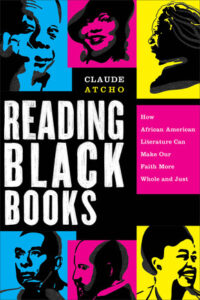 Reading Black Books: How African American Literature Can Make Our Faith More Whole and Just Claude Atcho (Brazos Press) $19.99 OUR SALE PRICE = $15.99 PRE-ORDER
Reading Black Books: How African American Literature Can Make Our Faith More Whole and Just Claude Atcho (Brazos Press) $19.99 OUR SALE PRICE = $15.99 PRE-ORDER
Speaking of that previous post about the power of reading and “the narrative arts”, what a joy it was to help promote our friend Mary McCampbell’s new Fortress Press book Imagining Our Neighbors as Ourselves: How Art Shapes Empathy; we announced it a bit early, but last week on the release date, I got to join with a bunch other fans of Mary McCampbell on Facebook to celebrate and discuss the book. My bestie pal Ken Heffner and I kicked it off, and throughout the day she had guests from Mako Fujimura to Steve Garber to African American lit expert pastor Claude Atcho. You can watch them all here, in fact, to see what others were saying about the book and about their own sense of how the narrative arts can help us love our neighbors.
Speaking of Mary’s friend Claude Atcho, we have been taking a few pre-orders for his soon to be released Reading Black Books coming out on May 17, 2022. We very highly recommend it. In a way, although the aforementioned Learning the Good Life is socially, religiously, and ethnically diverse, and Atcho’s book is more focused on black literature, yet they both come to us with similar ideals — namely, that readers will want to expand their diet of reading habits and learn about authors they may have heard of but have not studied. Books that through what some call common grace have significant religious themes even if the authors are not necessarily theological or even Christian.
Atcho is a remarkable author for this volume and even those of us who may know a bit about African American literature and its glories and insights, will learn much. And, happily, from the perspective of and within the context of a thoughtfully Christian worldview. Atcho is a pastor of Church of the Resurrection in Charlottesville, Virginia. He has taught African American literature at the collegiate level and is a regular writer and podcast contributor for Think Christian. He has written for Christ & Pop Culture, The Gospel Coalition, and The Witness: A Black Christian Collective.
I like very much how the publisher describes this, reminding us that we ought not merely listen to snippets or soundbites of African American voices. We should dive in, as they say. This book will help. Here is how they explain it:
Pastor and teacher Claude Atcho offers a theological approach to 10 seminal texts of 20th-century African American literature. Each chapter takes up a theological category for inquiry through a close literary reading and theological reflection on a primary literary text, from Ralph Ellison’s Invisible Man and Richard Wright’s Native Son to Zora Neale Hurston’s Moses, Man of the Mountain and James Baldwin’s Go Tell It on the Mountain. The book includes end-of-chapter discussion questions.
Reading Black Books helps readers of all backgrounds learn from the contours of Christian faith formed and forged by Black stories, and it spurs continued conversations about racial justice in the church. It demonstrates that reading about Black experience as shown in the literature of great African American writers can guide us toward sharper theological thinking and more faithful living.
I don’t know about you but I am familiar with most of the ten, but not all of them. And I have not read in earnest most of them. This guide will help. I like that he gives a short theological phrase to frame the discussion of each; for instance, sin (Native Son by Richard Wright), salvation (Moses, Man of the Mountain by Hurston), lament (a piece by W.E.B. Du Bois called “The Litany of Atlanta.”) Atcho shows that Ellison’s Invisible Man is somewhat about “the image of God” and Margaret Walker’s “For My People” is about hope. His exploration of Jesus through two poems by Countee Cullen’s (“Christ Recrucified” and “The Black Christ”) was stunning.
It will not be a surprise to those who know a bit about some of these authors that most did not have a conventional religious faith or an explicit theological agenda. In the introduction, Atcho admits, “the theologizing emerges from my reading of their literary forms and themes as a literary-minded pastor-theologian. This means,” he continues, “that chapters are a blend of close reading, theological reflection, and a Christian proclamation and application.”
I’m sure you you will appreciate his interesting introduction, including his own hopes. He obviously loves stories, loves literature, and loves the gospel. He hopes…
…that as you generously give of your time to read and engage this work, you will find your own love enflamed and increased both for these texts and for the Word who became flesh to interpret all stories and embrace all peoples. May we lean in together, listening by reading, and in the process may our faith be made more whole and just, to the glory of the Father, Son, and Holy Spirit.
Do I hear an “Amen”!?
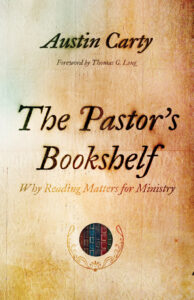 The Pastor’s Bookshelf: Why Reading Matters for Ministry Austin Party (Eerdmans) $19.99 OUR SALE PRICE = $15.99
The Pastor’s Bookshelf: Why Reading Matters for Ministry Austin Party (Eerdmans) $19.99 OUR SALE PRICE = $15.99
Here is another new book about books and reading, a fabulous book that I can hardly be more excited about. I highlighted this book in a Zoom book talk I gave the other day that wasn’t a gathering of clergy, but, as mainline denominational church leaders and Christian workers, I insisted that it was still ideal for them and both enjoyable and helpful. I wish I had time here to tell you more, but I can at least share a few of the topics in the three main sections.
“All The Reading We Don’t Remember” looks at reading for formation, on developing wisdom, how books can help us in learning to love. Clearly, we read not just for “information but for formation.”
“Not Just a Luxury” is a section with chapters on reading for pastoral care, for preaching, for vision casting, for leadership.
“For Whatever Reason” is a unit of chapters on reading “as” a pastoral visit, a spiritual discipline, and good pieces on reading with a proper spirit, choosing what to read, marking and filing our reading, and the like.
As he explains, six months into his first senior pastorate, Austin Carty sat in his office reading—not the Bible, not a commentary, not a theological tract, but a novel by Fyodor Dostoevsky. As the minutes turned to hours, while he sat engrossed in this book, he noticed something: he began feeling uneasy. And then anxious. And then guilty. What would someone think if they opened the door and caught him reading fiction?
You may recall some of the explicit teaching about this by Eugene Peterson. Or even the very inspiring book by Cornelius Plantinga called Reading for Preaching: The Preacher in Conversation with Storytellers, Biographers, Poets, and Journalists (which I also recommend widely, even to those who are not preachers.) This new one by Carty, The Pastor’s Bookshelf, is in that great company.
There is a fabulous forward by Rev. Thomas Long, in which he says: “One remarkable feature of Carty’s writing in this volume is how much of it is done in conversation with others, particularly parishioners and others who are on the receiving end of ministry. Carty hopes to encourage pastors who read, but not merely as a form of gratuitous self-improvement, but reading done among, with, and for the people of God.” Nice, eh? Perfect for anyone interesting in books, reading, and conversations stimulated by the printed page.
Check out these other great endorsements:
Christians are a people of the Word, yet we are formed more and more today by wanton, careless words. Those who will lead the church well will be those who are formed by good words—those who know the power words have over our hearts and minds. Those who read good books well will be such leaders. Pastors who read and live by the wisdom in this book will be changed, as will their ministries and the people to whom they minister. This book belongs on every pastor’s shelf.
— Karen Swallow Prior, author of On Reading Well: Finding the Good Life through Great Books
Reading is crucial for ministry, not as a mine for anecdotes and illustrations, but as an apprenticeship of the imagination. In this warm and wise book, Austin Carty invites pastors to develop capacious reading habits, as wide and curious and wonderful as the world in which they serve. I hope this book is an occasion for many pastors to build new shelves of poetry and fiction, biography and memoir, all of them adventures in understanding humanity.
— James K. A. Smith editor in chief of Image journal, author of You Are What You Love
I am gobsmacked by this book’s threefold beauty: its writing, its erudition, and the author’s deep commitment to what true reading can give not only pastors, but us all.
— Maryanne Wolf author of Reader, Come Home: The Reading Brain in a Digital World
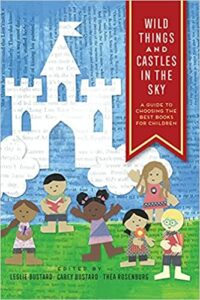 Wild Things and Castles in the Sky: A Guide to Choosing the Best Books for Children edited by Leslie Bustard, Carey Bustard & Thea Rosenburg (Square Halo Books) $29.99 OUR SALE PRICE = $23.99
Wild Things and Castles in the Sky: A Guide to Choosing the Best Books for Children edited by Leslie Bustard, Carey Bustard & Thea Rosenburg (Square Halo Books) $29.99 OUR SALE PRICE = $23.99
Beth and I have pondered how to best explain this rich, wonderful resource, sharing our enthusiasm and gratitude for its presence in the world. This book is a gift, a treasure, more than merely lovely, nearly glorious. It is needed and fills a great niche in the “books about books” shelf as well as in the parenting and teaching genre. So many of the entries are autobiographical that it nearly could be put with memoirs, offering inspiring glimpses into the lives of others who have cared for children well by reading the best books to them or with them. As with most titles published by our friends at Square Halo Books, it is exceptional, artful, valuable. It is a book we are honored to stock and eager to tell you about.
For starters, I should say that while I am convinced it does indeed fill a need in the genre of books about books — there really isn’t anything quite like it in the marketplace — there are others that are somewhat similar. Over the years we have consulted and recommended Honey for a Child’s Heart: The Imaginative Use of Books in Family Life by Gladys Hunt and we are pleased that Zondervan has kept it in print, updating and expanding it (most recently last fall.) What a grand and helpful book! And where would we be without the essential Read-Aloud Handbook by Saint Jim Trelease (now in its Eighth Edition.)
It’s a little eccentric with its romantic sort of worldview, but we were happy to order the updated re-issue of Pipers At the Gates of Dawn: The Wisdom of Children’s Literature by Rolling Stone and New Yorker writer Jonathan Cott as he tells of his encounters with children’s writers Dr. Seuss, Maurice Sendak, William Steig, Astrid Lindgren, P. L. Travers and more; the new edition has a fascinating forward by the erudite and passionate Maria Popova (author of Figuring and A Velocity of Being: Letters to a Young Reader.)
And, again and again, we must mention Steeped in Stories: Timeless Children’s Novels to Refresh Our Tired Souls by Mitali Perkins (Broadleaf; $24.99 OUR SALE PRICE = $19.99.) We have loved this wise and moving study of “seven timeless children’s novels for adults living in uncertain times.” We were delighted to be sure that Leslie Bustard knew of this as she was working with her team putting together the eager-awaited Wild Things and Castles in the Sky and she was so taken with it that she got Mitali to offer a contribution to this new collection (“The Wells of Souls and Memory: Writing for Children.”)
The subtitle of the new Wild Things and Castles in the Sky: A Guide to Choosing the Best Books for Children is important since this really is a user’s guide to what to read next, how to choose the “best books” sharing discernment and guidance and so forth. It is a resource replete with fabulously interesting annotated lists by experienced parents, teachers, curriculum developers, and writers, in each of nearly 50 categories. (Which leads me to say what we might as well acknowledge — this useful 300 page book is nearly underpriced; for all that you get it is a great bargain, offering a ton of content that will last you a lifetime.)
Allow me to also suggest this, however: even if one is less needful of the recommendations and the annotations and each author’s list of book suggestions, the book is still a treasure worth every penny. As I hinted earlier, Wild Things is not only a jam-packed resource of reading ideas but it is an engaging and captivating collection of pieces on why reading to children or giving books to children or teaching literature to children matters. Some of the introductory pieces, quite apart from each author’s own lists, make for spectacular reading.
Kudos to Leslie, her daughter Carey, and co-editor Thea, for bringing together a diverse and curious roster of readers willing to tell their stories. We have a breathtaking, poignant piece by a father telling of reading to his son with Down’s Syndrome; we have a woman of color describing her experience with white literature; we get Matthew Dickerson offering insights about “sorrow and grace” in Tolkien’s works (and a list of other books that evoke healthy tears.) What good words from musician, artist, writer, and mom Katy Bowser Hutson offering a chapter called “Imagination Boot Camp” which explores the role of fairy tales. From Pahtyana Moore writing about virtue in her piece called “The Heartbeat of Humanity” to “Why Should Children Be Given Old Books” by Anne Kennedy who makes the case for antiquarian books to Junius Johnson’s reflection on fantasy in his chapter called “A Dragon in the Hand is Worth Two in the Bush”, this collection offers hours of fun reading for any book loving adult, and deep wisdom for any person wanting to read widely for the sake of living well in the world.
To see chapters that are written by serious classical educators next to a chapter on graphic novels is a delightful surprise and shows the breadth and diversity Wild Things brings. To have a piece on “the transcendentals” (which is what fancy pants classical scholars, drawing on medieval scholasticism, call the Aristotelian virtues of truth, goodness, and beauty) in a lively chapter about picture books is a blast. To get to read several pieces by Latina writers — Araceli Cruz tells us about “mirror books” in her chapter called “Si Se Puede” and the respected homeschool blogger Erendira Ramirez-Ortega gives us a fine overview of Latino literature in “A Beautiful Word Beautifully Said” is a great gift.
There is very helpful chapter called “In His Image” on valuing diverse characters in children’s books, written by children’s book authors of color, Dorene Williamson, Tina Cho, and Dorian Lazo Gilmore-Young. You have got to read a chapter on race called “Symbols on the Doorframe” by Shanika Churchville — a Sri Lankan woman from Lancaster Bible College who is married to an African American man and who knows black literature well.
There are some helpful, observant, instructive chapters about different genres and various age groups. There is one on toddler books which is excellent. We get a piece on “classic picture books” and another on “contemporary picture books.” There is one on “chapter books” and yet another on “chapter books with pictures.” Naturally there are ideas for middle school and high school readers. There is a good chapter offering discernment on Newbery Books. Many will love the chapter on poetry, the one on music, and the one on allegory by Quantrilla Ard. There is a chapter on adapted and introductions to Shakespeare which I suspect will be a real assist for some.
Besides these marvelously interesting chapters serving as good guides to various ages and genres, there are topical pieces scattered throughout — I truly adored some of these and eagerly await dipping in to more, soon. For instance, these are essays and stories about what is going on when we read or invite children and youth to read. Rebecca Becker has a piece on “narration” called “Connecting with Stories” and there are remarkable entries on enchanted places, representation, telling stories, and a great one on “family reads” called “The Grandchildren’s Library” by Andi Ashworth.
Many Hearts & Minds customers and BookNotes fans will be delighted to see an essay called “Finding Joy in the Everyday” by the book-loving grandmother (and memoirist) Margie Haack on what she calls “quotidian books. Annie Nardone has a great chapter on books about art appreciation (“Ordering the Soul.”) Artist and musician Matthew Clark has a piece on “goodness” entitled “The Fragrance of the Blessed Realm.”
So many of these authors are, I believe, shaped by the best sorts of values and perspectives, living into a faithful sense of common grace and the goodness of this broken world. They do not only recommend overtly Christian books, of course; mostly not, actually. But they care about the deepest ways of God’s Kingdom anyhow books can be avenues for deepening our imaginations for abundant Kingdom living. Square Halo has done other such anthologies (in fact, one is in tribute to us here at Hearts & Minds called A Book for Hearts & Minds: What You Should Read & Why where various friends and leaders offer writerly essays about the best books in various fields, sort of a world-class homage to BookNotes.) We trust this new anthology and while we may not know every author and his or her suggestions, the overall frame of the project is righteous and good.
For instance, in a chapter on cultivating the imagination through stories (“Enchanted Places”), Elizabeth Harwell cites our friend Jamie Smith, from his book Imagining the Kingdom with a nod to a line from Calvin Seerveld:
Christian worship needs to be an incubator for the imagination, inviting us into the “real world” by bringing us aesthetic olive leaves from the kingdom that is coming, helping us to envision what it would look like for God’s will to be done on Earth as it is in heaven.
Anyone who says that that is why they do what they do has my attention!
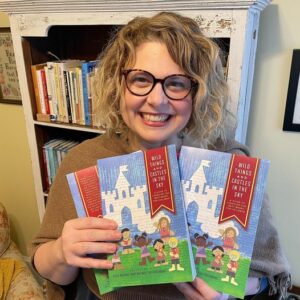 Finally, here is another helpful contribution in Wild Things and Castles in the Sky. There are several useful indices in the back. One lists all the books that the various contributors recommended in order by grade level which is a boon. Another is a fabulously fun and very useful list of holiday books by Carey Bustard. And, this: the three editors had to weigh in one last time naming some of their favorite reads for kids. You can imagine book lovers like them pouring over the hundreds of recommendations, the rich, short essays, the ardent
Finally, here is another helpful contribution in Wild Things and Castles in the Sky. There are several useful indices in the back. One lists all the books that the various contributors recommended in order by grade level which is a boon. Another is a fabulously fun and very useful list of holiday books by Carey Bustard. And, this: the three editors had to weigh in one last time naming some of their favorite reads for kids. You can imagine book lovers like them pouring over the hundreds of recommendations, the rich, short essays, the ardent 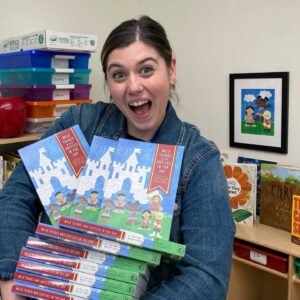 annotations, and then thinking — wait, what? We have to at least name a few final titles and authors. What a joy. Thank you, Leslie Bustard, Carey Bustard, Thea Rosenburg. You’ve inspired this old bookseller with renewed passions, some new ideas, and even more previously undiscovered authors.
annotations, and then thinking — wait, what? We have to at least name a few final titles and authors. What a joy. Thank you, Leslie Bustard, Carey Bustard, Thea Rosenburg. You’ve inspired this old bookseller with renewed passions, some new ideas, and even more previously undiscovered authors.
Listen to poet Luci Shaw who wrote a wonderful introductory chapter:
For any parent or grandparent, any aunt or uncle, this generous guide for What to Read Next to your beloved is a heartwarming, 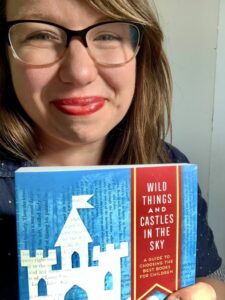 mind enlarging, appetizing pathfinder to the wide range of available kid-lit.
mind enlarging, appetizing pathfinder to the wide range of available kid-lit.
And listen to this great reminder by singer-songwriter Sarah Groves:
Children’s books are never just for children. They are also for anyone who remembers what it means to be childlike. Children’s stores return us to the heart of things as little else does, and gives us language to talk about the bigger things. Wild Things and Castles in the Sky is a sweet reminder of why literature for children is essential for us all. You will find friends here in these pages.
+++
TO PLACE AN ORDER
PLEASE READ THESE REMINDERS AND THEN CLICK ON THE “ORDER” LINK BELOW.
It is helpful if you would tell us how you prefer us to ship your orders. The weight and destination of your package varies but you can use this as a general guide.
There are generally two kinds of US Mail options, and, of course, UPS. If necessary, we can do overnight and other expedited methods, too. Just ask.
- United States Postal Service has the option called “Media Mail” which is cheapest but can be slow. For one typical book, usually, it’s about $3.50.
- United States Postal Service has another option called “Priority Mail” which is $8.35 if it fits in a flat rate envelope. Many children’s books and some Bibles are oversized so that might take the next size up which is $8.95. “Priority Mail” gets much more attention than does “Media Mail” and is often just a few days to anywhere in the US.
- UPS Ground is reliable but varies by weight and distance and may take longer than USPS. We’re happy to figure out your options for you once we know what you want.
– DON’T FORGET TO LET US KNOW WHAT SHIPPING METHOD YOU PREFER –
BookNotes
SPECIAL
DISCOUNT
20% OFF
ALL BOOKS MENTIONED
+++
order here
this takes you to the secure Hearts & Minds order form page
just tell us what you want to order
inquire here
if you have questions or need more information
just ask us what you want to know
Hearts & Minds 234 East Main Street Dallastown PA 17313
read@heartsandmindsbooks.com
717-246-3333
It is complicated for us, but we are still closed for in-store browsing due to our commitment to public health (not to mention the safety of our staff and customers.) The vaccination rate here in York County is sadly lower than average and the new variant is now spreading. Our store is a bit cramped without top-notch ventilation so we are trying to be wise and faithful.
Please, wherever you are, do your best to be sensitive to those who are most at risk. Many of our friends, neighbors, co-workers, congregants, and family members may need to be protected since more than half of Americans (it seems) have medical reasons to worry about longer hazards from even seemingly mild Covid infections.
We are doing our famous curb-side customer service and can show any number of items to you if you call us from our back parking lot. We are eager to serve and grateful for your patience as we all work to mitigate the pandemic.
Of course, we’re happy to ship books anywhere. Just tell us how you want them sent.
We are here 10:00 – 6:00 EST / Monday – Saturday, closed on Sunday.

